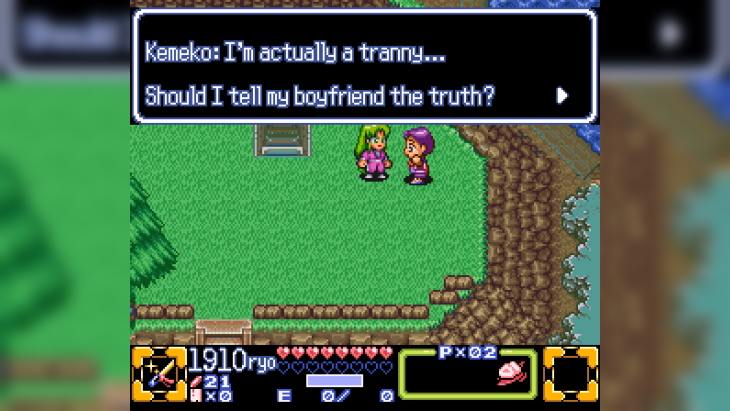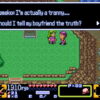
A translator has abandoned four years of work on an English fan translation of Ganbare Goemon 3: Shishijyūrokubei no Karakuri Manji Katame (roughly “Good Luck Goemon 3: Shishirokubei’s Mechanical Manji”), after abuse and harassment over translating the word “trans.”
The late 80’s to 90’s Goemon video game series has not released most of its titles in the west. Out of 20 mainline games released to home or handheld consoles (including remakes), only five have been officially released in the west- under the title Mystical Ninja Starring Goemon. One of those titles was included in the compilation, Konami GB Collection Vol.3.
Ganbare Goemon 3: Shishijyūrokubei no Karakuri Manji Katame was released in 1994 for Super Famicom (SNES in the west), and later on Wii and Wii U Virtual Console- but only in Japan. The Goemon Fandom wiki also claims the game came to Nintendo 3DS in Japan.
As such, some fans have relied on emulators and fan translations to enjoy those games- walking the line on whether it still constitutes piracy when the title is no longer in print.
Editor’s Note: Niche Gamer does not condone or support piracy in any form.
On January 25th, “DDS Translation” tweeted a new update to an emulator ROM file for Goemon 3, with an English fan-translation. One Twitter user Kurt Kalata, a writer of Hardcore Gaming 101 and controller of their official Twitter account, took issue with the translation of one scene in particular.
For our readers using machine translation for this article, an NPC called Kemeko says to the player character “I’m actually a tranny… Should I tell my boyfriend the truth?”
Katala posted the screenshot with the tweet “(TW [trigger warning]: transphobia) is it too much to ask for right wing fan translators to NOT stick slurs into their work?” Later, Katala compares the translation to his seemingly physical copy of the original game, and confirms the original uses the Japanese term “newhalf” (“ニューハーフ”).
According to Wikitionary, the term is slang for a transgender woman. Katala’s tweet seems to concede it was an accurate translation, “but it’s still a shitty word to translate it as.”
Assuming Katala has played the original Goemon 3 to completion, combined with their work on Hardcore Gaming 101 and their tweet meaning they know at least some Japanese- then a transgender NPC should not have been a surprise to Katala.
In Goemon 3, one of the primary antagonists is Bismaru, a cross-dressing man who highly resembles one of the major characters Ebisumaru. The character uses a male voice actor (Kenichi Ogata, the same as Ebisumaru), and acts very effeminately.
The character is most likely the Japanese “otokonoko” trope- a cross-dressing effeminate man that is blatantly a man due to being very muscular, a deep voice, having a strong jaw-line, or a stubble beard. In Bismaru’s case however, he resembles one of the major male characters to convey that point.
In the western version of a later game (Goemon’s Great Adventure), Bismaru would be referred to as “he” on numerous occasions [1, 2], though the Goemon Fandom wiki claims the character is refereed to as she in the western instruction booklet. That game also includes another, more typical version of an otokonoko.
To some, cross-dressing is deemed the same as being transgender. For example, some claim the word “trap” (slang for a male anime character that could easily pass for a woman, i.e. You fall for a “trap” when you find them attractive) is offensive to transgender people.
Even focusing purely on Goemon 3, it is surprising to see Katala not realize the tone of the game (light-hearted comedy), and that similarly “outdated” humor extended beyond that single NPC.
Nonetheless, Katala had drawn attention to the author of the fan translation, and drew more ire. One Twitter user stated “One of the benefits of doing a fan translation 2020 is the possibility to remove discriminatory language that, while still wrong then, was in common use three decades ago. It is a shame that the authors of this hack decided to mar their hard work by using a slur.”
The translation was also discussed on the Reset Era forum [1, 2]. User’s quickly found the translator’s Twitter page, and while some felt the translation was accurate (or at least, was indicative of the time the game was originally produced), most began to look through the author’s tweets to find evidence of them being “right-wing,” or having bigoted opinions.
Despite some finding evidence that the translator was open to critique and alternative ideas, the translator seemingly received much abuse. On January 26th, they had removed all their posts from Twitter, and changed their account name to “.”. They tweeted the following message:
“My apologies to everyone. I needed some time to mull over this mess.
I want to clarify that whatever scripts I’ve translated don’t reflect who I am, or what I believe. People are calling me a far-right extremist now. Me? These people know nothing about me.
And the word that set off this whole mess? I didn’t even know anybody considered it completely off limits. I thought it was just a silly abbreviation, a slightly taboo word, something only a bit edgy, but well within the realm of a reasonable translation of the original Japanese line.
Yes, the original Japanese line in the game is insensitive, but please don’t think that having translated it in an insensitive way means that I’m somehow a hateful person, because I’m not. It crushed me to see the fallout of this. Anybody who has followed me for any amount of time knows that I wear my heart on my sleeve. I love all people, and every single living thing on this planet.
And I care about the games, too. I started working on fan translations because I care… I just wanted to share these experiences with people.
Seeing how all of this has turned out… It’s really crushed me. If one single word that I didn’t even know was so inexcusable caused this sort of uproar, what other words are off limits without my knowing? To be honest, the very thought terrifies me.
This whole thing has crushed my passion for translating, video games, and even simply writing in general. I can’t continue with it.”
One Twitter user claimed the project had been cancelled, as there was no other translator. The project had up to that point taken “4 years of work” and $400 USD “worth of research material for accurate translation.”
Reset Era also caused outrage over Ion Fury, after the 90’s action film-themed game had a bottle of “Ogay” soap in a bathroom (a likely parody of the Olay soap & skin care brand).
The users also took issue with comments made by the developers (mocking social justice warriors, feminists, criticisms of the World Health Organization declassifying transgender people as mentally ill, and their disapproval of parents declaring a child as trans “at birth”), and an out-of-bounds glitch revealing the word “fagbag” outside of the game’s level.
While the developers apologized and patched out the offending bottle, the outcry to their censorship was great enough for the developer’s official Twitter to encourage pirating the game. The censorship was later rolled back.
In 2015, some took offense to a Kickstarter backer-reward joke in Pillars of Eternity. A memorial on an in-game tombstone read “Here lies Firedorn, a hero in bed. He once was alive, but now he’s dead. The last woman he bedded turned out a man. And crying in shame, off a cliff he ran.”
After outcry, this was later changed, with the original backer supplying the following epitaph: “Here lies Firedorn, a bard, a poet. He was also a card, but most didn’t know it. A poem he wrote in jest was misread. They asked for blood, so now he’s just dead.”
Official translations of Japanese games and anime have long had issues with how accurate their translations were, with the internet helping to expose when “localization” had gone to far. Though it has also led to others demanding censorship for what they deem acceptable.
Most recently, a translator for Nicchi Ippon Software America (NISA) stated they changed jokes they deemed sexist to be “culturally appropriate.” NISA would later issue a statement, claiming they did not “engage in censorship or overzealous editing.”
What do you think? Sound off in the comments below!

